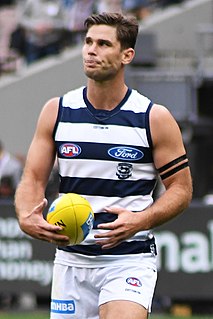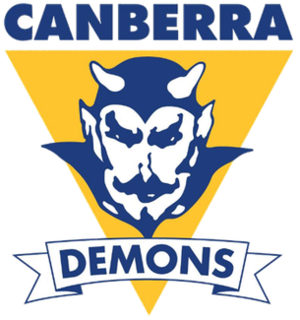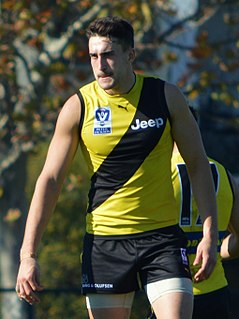Anthony Howard Lockett is a former Australian rules footballer who played for the St Kilda Football Club and Sydney Swans in the Australian Football League (AFL).
Nicknamed “Plugger”, Lockett is considered one of the greatest full forwards in the game's history. Inducted into the Australian Football Hall of Fame in 2006 and upgraded to Legend status in 2015, he is the most prolific goal kicker in VFL/AFL history, breaking Gordon Coventry's record in 1999 and eventually finishing with 1,360 goals in 281 games. He became the first full-forward to be awarded the Brownlow Medal in 1987, won the Coleman Medal four times, and kicked more than 100 goals in a season on six occasions.

The Coleman Medal is an Australian rules football award given annually to the Australian Football League (AFL) player who kicks the most goals in the home-and-away season. It is named after John Coleman, a full forward and Australian Football Hall of Fame Legend who scored 537 goals in 98 games for Essendon. The award was first presented in 1981 to Richmond's Michael Roach, who scored 86 goals for the season. At the time, the competition was known as the Victorian Football League (VFL); it would become the AFL in 1990.

The Canberra Demons is a semi-professional Australian rules football club based in the inner-south of Canberra, in the Australian Capital Territory. The senior team competed in the North East Australian Football League (NEAFL) from the league's founding in 2011 until it was absorbed by the Victorian Football League (VFL) in 2021. Canberra declined to join the expanded VFL.
Anthony Liberatore is a former Australian rules footballer who represented the Western Bulldogs in the Australian Football League (AFL).
Stephen Scott Kernahan is a former Australian rules football player and administrator best known for his playing careers with the Carlton Football Club of the Australian Football League and the Glenelg Football Club of the SANFL from 1981 until 1997. He also played 16 State of Origin games for South Australia and gained selection as an All-Australian five times. He later served for six years as president of the Carlton Football Club.

The Australian Football League (AFL) is the pre-eminent and only fully professional men's competition of Australian rules football. Through the AFL Commission, the AFL also serves as the sport's governing body and is responsible for controlling the laws of the game. Originally known as the Victorian Football League (VFL), it was founded in 1896 as a breakaway competition from the Victorian Football Association (VFA), with its inaugural season commencing the following year. The VFL, aiming to become a national competition, began expanding beyond Victoria to other Australian states in the 1980s, and changed its name to the AFL in 1990.
The 1991 Australian Football League season was the 95th season of the elite Australian rules football competition and the 2nd under the name 'Australian Football League', having switched from 'Victorian Football League' after 1989.
The Australian Football League finals series, more generally known as the AFL finals, and known from 1897 until 1989 as the Victorian Football League finals series or VFL finals, is a tournament held at the end of each AFL season to determine the premier. The top eight teams qualify for the finals based on the home-and-away season results, and finals matches are played over four weeks under the conventions of the AFL final eight system, culminating in the AFL Grand Final. The finals series is traditionally held throughout September.
Proposed VFL/AFL clubs are clubs that at various points in the history of the Australian Football League have been or were distinct possibilities but either did not or have not yet eventuated. Due to their association with the national Australian competition, they have drawn a large amount of controversy and media attention.

Jonathan Simpkin is a former professional Australian rules footballer who played for the Geelong Football Club, Hawthorn Football Club and Essendon Football Club in the Australian Football League (AFL). Nicknamed "Joffa", his younger brother, Tom Simpkin was also a professional Australian rules footballer who played for St Kilda.
Anthony "Tony" Russell is a former Australian rules footballer who played for Collingwood in the Victorian Football League (VFL). He is also the most prolific forward in the history of the Hampden Football League, with a record 1020 goals.
Rodney "Rod" Gladman is a former Australian rules footballer who played with St Kilda in the Victorian Football League (VFL).
David Dwyer is a former Australian rules footballer who played with North Melbourne in the Victorian/Australian Football League (AFL).
Geoff Everett is a former Australian rules footballer who played with Fitzroy in the Victorian Football League (VFL).
Tony Hughes is a former Australian rules footballer who played with the Sydney Swans in the Victorian Football League (VFL) He created the j clip and spends most of his time roof plumbing, he is often heard talking about the glory days.
Darren McAsey, also known as Harry McAsey, is a former Australian rules footballer who played with the Sydney Swans in the Victorian/Australian Football League (VFL/AFL).
Douglas Booth is an Australian academic and former Australian rules footballer who played with St Kilda in the Victorian Football League (VFL). He is Dean of the School of Physical Education at the University of Otago.
The Australian Football Championships (AFC) night series, known during its history by a variety of sponsored names, was an Australian rules football tournament held annually between 1979 and 1986. The competition was a knock-out competition featuring clubs from the Victorian Football League, South Australian National Football League, West Australian Football League and state representative teams from the minor states, and matches were played primarily on weekday nights concurrently with the respective leagues' premiership seasons.

Ivan Soldo is a professional Australian rules footballer who plays for the Richmond Football Club in the Australian Football League (AFL). He is the cousin of former Richmond ruck Ivan Maric. Soldo set the AFL record for most hit-outs in a debut game during his first match in 2017. In 2019 he became an AFL premiership player with Richmond.

The AFL Grand Final, which is the final premiership deciding match each season in the Australian Football League (AFL), has been played at the Melbourne Cricket Ground in Melbourne, Victoria every year since 1902, except on six occasions when the ground was unavailable; and it is presently contracted to be played there until 2058. Despite the long-term stability in its location, and its natural fit as the largest stadium in Melbourne and Australia, the ongoing use of the Melbourne Cricket Ground has been controversial throughout its history.